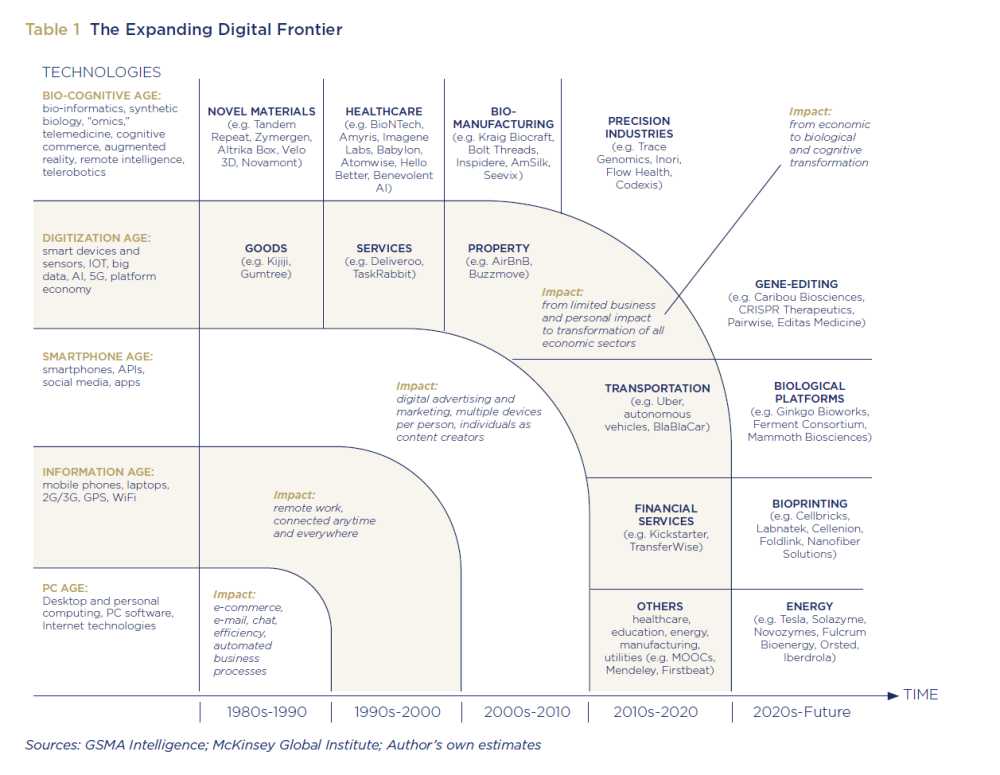Even as we grapple with the advances and challenges of the “Digital Age,” some pathfinders are already charting new revolutionary advances in quantum physics, biology, nanotechnology, behavioral and cognitive sciences and artificial intelligence.[1] Table 1 charts the expanding digital frontier, which accelerated due to scientific breakthroughs and to the cascading changes wrought by the pandemic. New industries are appearing, led by pioneering companies on both sides of the Atlantic.

The pandemic has been a major accelerant of the biological revolution. The pace of scientific research into SARS-CoV-2 has been extraordinary, even when compared to the work that accompanied the SARS epidemic in 2002–03. Scientists mapped the virus genome in weeks rather than months. Less than six months after the discovery of the virus, 161 vaccine and therapy candidates were in the research-and development pipeline. Now multiple vaccines are available and many more are in development. The breakthrough of successful mRNA vaccines promises to pave the way for a new generation of products.[1]
By 2025, 40% of the datasphere will be in health – the largest of any sector or industry. This explosion of genetic and health data – and increasing abilities to process it – hold significant potential for scientific and medical achievement worldwide. Telemedicine, telepresence, and telesurgery are transforming medical techniques and generating greater cross-border trade in healthcare services.[1]
Synthetic biology, a field that uses biology as a manufacturing platform, has emerged as a foundational element of the $4 trillion bioeconomy. The market for goods and services related to synthetic biology is expected to reach $15 billion by 2025. McKinsey estimates that insights derived from biological data could account for more than half of economic potential in the next decade. Looking farther out, it suggests that as much as 60% of the physical inputs to the global economy could, in principle, be produced biologically. Attaining that full potential is a long way off, yet even modest progress could transform economies, societies, and our lives, including what we eat and wear, the medicines we take, the fuels we use, and how we construct our physical world.[2]
[1] Daniel S. Hamilton, The Transatlantic Digital Economy 2017 (Washington, DC: Center for Transatlantic Relations, 2017); Digital Economy Compass 2018, Statista.com, file:///C:/Users/Owner/Downloads/study_id52194_digital-economy-compass.pdf; International Technology and Innovation Foundation (ITIF), “The Task Ahead of US,” http://www2.itif.org/2019-task-ahead.pdf.
[2] Gigi Gronvall, “Improving US-EU Effectiveness in Health and Health Security,” Woodrow Wilson Center, February 4, 2021, https://www.wilsoncenter.org/article/improving-us-eu-effectiveness-health-and-health-security; Paul A. Rota et al., “Characterization of a novel coronavirus associated with severe acute respiratory syndrome,” Science, May 2003, Volume 300, Issue 5624; McKinsey Global Institute, The Bio Revolution: Innovations transforming economies, societies, and our lives, May 2020, https://www.mckinsey.com/~/media/McKinsey/Industries/Pharmaceuticals%20and%20Medical%20Products/Our%20Insights/The%20Bio%20Revolution%20Innovations%20transforming%20economies%20societies%20and%20our%20lives/MGI-Bio-Revolution-Report-May-2020.ashx; Alison Snyder, Eileen Drage O'Reilly, “The race to make vaccines faster,” Axios, April 23, 2020.
[3] Gronvall, op. cit.; McKinsey, op. cit.
[4] Lindsay Gorman, “A Silicon Curtain is Descending: Technological Perils of the Next 30 Years,” German Marshall Fund of the United States, September 12, 2019, https://www.gmfus.org/publications/silicon-curtain-descending-technological-perils-next-30-years; McKinsey, op. cit.
Authors



Global Europe Program
The Global Europe Program is focused on Europe’s capabilities, and how it engages on critical global issues. We investigate European approaches to critical global issues. We examine Europe’s relations with Russia and Eurasia, China and the Indo-Pacific, the Middle East and Africa. Our initiatives include “Ukraine in Europe”—an examination of what it will take to make Ukraine’s European future a reality. But we also examine the role of NATO, the European Union and the OSCE, Europe’s energy security, transatlantic trade disputes, and challenges to democracy. The Global Europe Program’s staff, scholars-in-residence, and Global Fellows participate in seminars, policy study groups, and international conferences to provide analytical recommendations to policy makers and the media. Read more

Explore More
Browse Insights & Analysis
360° View of How Southeast Asia Can Attract More FDI in Chips and AI





